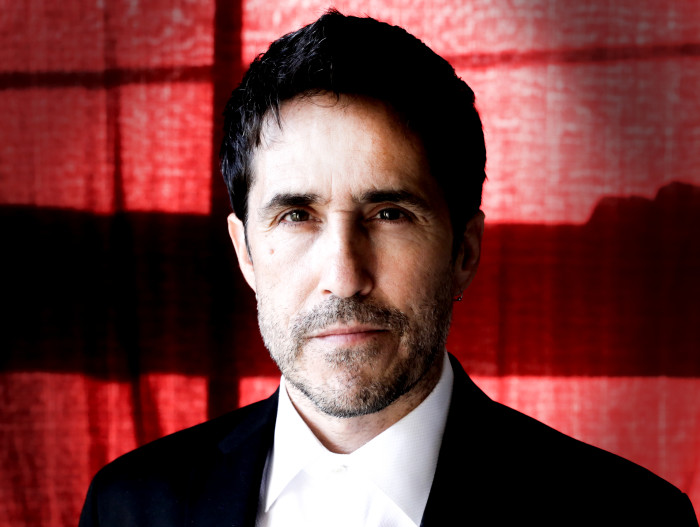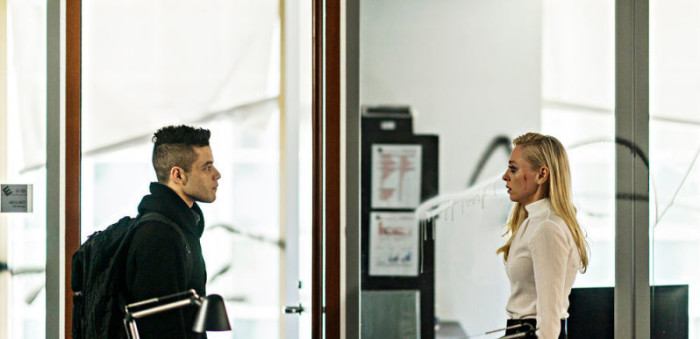'Mr. Robot' Composer On Creating The Moody And Masterful Music Of The USA Hacker Series [Interview]
Mr. Robot is arguably the most distinctive series on television — a moody and haunting techno-opera that floods viewers with a crushing sense of isolation. Much of the credit can be given to showrunner Sam Esmail's cinematic eye, maintaining a house style of low lighting and negative space that lend to the oppressive environment — along with a stylistic gimmick every now and then in the form of a long-take episode or a sentient emoji.
But you can't make a moody show without mood music, for which Emmy Award-winning composer Mac Quayle is responsible. Quayle won an Emmy for his work on the first season of the USA Network drama, but he continues to produce award-worthy work with his exclusively electronic, dissonant score.
We spoke to him about how he creates the synth-heavy Mr. Robot score, and his upcoming live performance of the USA Network's popular soundtrack.
What's your process in creating the score for Mr. Robot? Are you given a script beforehand or do you simply work closely with Sam Esmail?
I'm offered the scripts. In season 1 I did not read them, and I really enjoyed watching each episode fresh, not knowing what was coming. Season 2, I read the scripts and I kind of knew what was happening, so season 3 I went back to not reading the scripts.
It's very much a collaboration with Sam Esmail. Pretty much every episode begins with a conversation with what he's looking for the music to do to help tell his story. We go through the episode, we look at where we think the music should play, where it should stop, what kind of feelings it should evoke. And those are the basic parameters I use to start composing.
I heard that for the first two seasons you were composing in LA while he was in New York, but this season you were working together in LA in the same room. Has this affected how you work at all?
That's true, I mean it happened a little on the first and second seasons just because of the schedules, he was in New York for a longer time overlapping with the post-production. So he didn't make it to LA for the last few episodes, but they restructured this season so he would finish shooting and be able to be in Los Angeles for the post-production. And that's been great because we've gotten a lot of face time this season and I feel it's really helped our collaboration.
 You are largely responsible for the score of Mr. Robot, but do you have any input on the needle drops of pop or rock songs that the show has become well known for?
You are largely responsible for the score of Mr. Robot, but do you have any input on the needle drops of pop or rock songs that the show has become well known for?
I have absolutely nothing to do with them. I'm getting complimented for them all the time [Laughs]. But I guess there's some confusion out there about what the composer does. Typically the composer is not involved with those – there are some exceptions – but yeah, those needle drops come from a variety of sources. Sam sometimes picks them, there's a music supervisor that is involved, the editors sometimes find things to put in there. It's a really important collaboration that involves all of us.
The music plays a huge part in creating the almost oppressive atmosphere that Mr. Robot is known for. Can you describe the instruments or types of distinct motifs?
From the beginning, Mr. Robot was conceived to have a totally electronic score. Not just created by electronics but sounding very electronic — synthesizer sounds, drum machine sounds. That has been the core sound from the beginning. We have expanded it a little in seasons 2 and 3, adding some more organic tones to the palette, but it's very electronic. I use computer, I use software that's designed for just for this task of creating and producing music, a lot of very clever pieces of software that create amazing sounds. It's very fun to tweak it and come up with ultimately what is the final sound for Mr. Robot.
What were some of the organic sounds that you mentioned that were introduced in later seasons?
There's definitely been orchestral strings — we started using some of those in season 2 and now we've been using them more in season 3. The piano was introduced in season 1, but season 2 found us using a more organic piano sound that has continued in season 3. It's been nice to have that as part of the palette. I recorded cello on one cue this season and that was a really nice organic, real sound to have to one of the episodes.
At the beginning of scoring Mr. Robot, trying to achieve that exclusively electronic sound, did you find it limiting as an approach, or was it something that allowed you to creatively flourish?
Definitely not limiting. The world of electronic sounds is pretty much limitless. You can just create almost anything you can imagine, so in a way it's almost too unlimited. [Laughs] The choices are just endless. So definitely the opposite of being limited. I've been working with synthesizers for decades and I'm very comfortable in that realm, so it felt right, it felt like a good fit for me.
 Have you noticed a growing interest in synth-driven TV soundtracks, thanks to the popularity of Mr. Robot and now Stranger Things?
Have you noticed a growing interest in synth-driven TV soundtracks, thanks to the popularity of Mr. Robot and now Stranger Things?
I think there has been more recently, I'm not quite sure what it is. Halt and Catch Fire has a great synth score and technically that was on the air before Mr. Robot. But yeah, it has become popular, I think in film as well, so we'll see if it's just a phase we're going through or if we'll move on to something else.
You're going to be performing Mr. Robot's heavily synth and electronic-based music at the Roxy in LA next month. Did you have any hurdles adapting that to a live concert performance?
The process that I've gone through so far is to first choose my favorite pieces of music from the show. Then I try to imagine how it might be performed both technically, [and whether it will] be enjoyable to perform, will it be entertaining to the audience. If the piece meets all those criteria, then I begin working on it to rehearse and perform. Working on it may mean doing a new arrangement, maybe it needs to be extended, maybe it needs more of a rhythm, maybe it needs a new section. I've done some medleys, going from one piece to another. It takes these pieces written for the show and adapts them to what I think is a more appropriate version for the show.
(Tickets for the December 5 show can be bought here.)
The work you're doing on season 3 is phenomenal. As an avid TV viewer but a casual TV music listener, the scores have even captured my attention. Are there different techniques or motifs you use from season to season?
There's not really anything that was conceptualized beforehand. We just started the season and started writing music, and we had a vague idea that we wanted to expand the music a little more toward organic instruments so we've been doing that. And I think that there's something that's been naturally happening with us, which is we've established this sound, we've enjoyed it, but we're always searching for something new. The core sound is still there, but then we're trying to push the sound out. If there's one new addition this season, Sam has been very into the sound of clocks ticking. So you'll notice that there's quite a few scenes where just in the sound design, not even in the music, you'll hear a clock ticking in the background. And we've incorporated the clocks ticking in some of the music as well, so that's been one sound that has been new this season.
